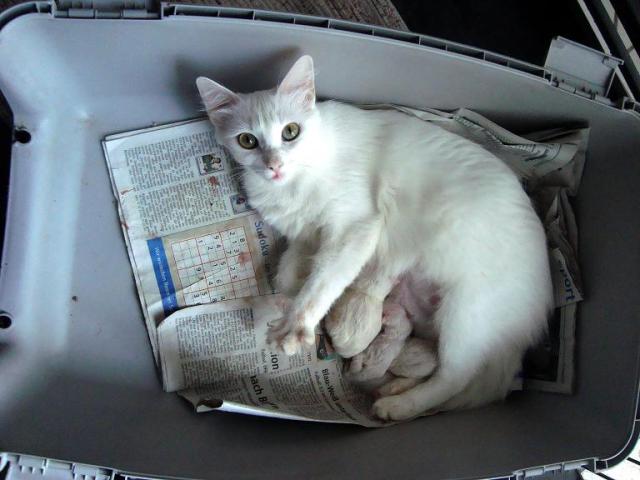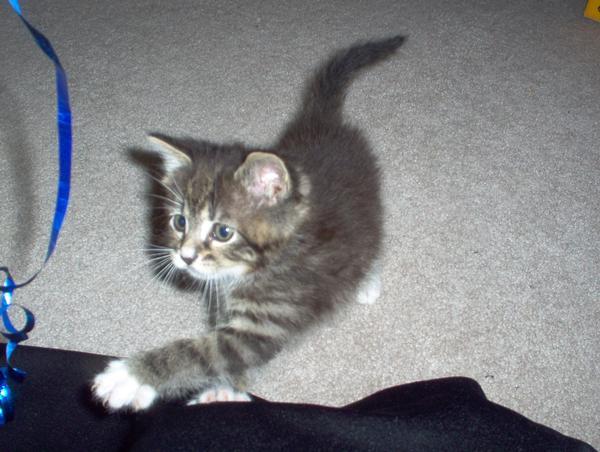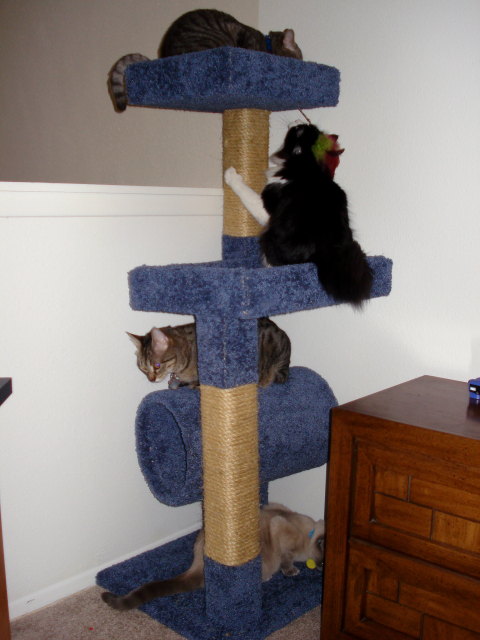QuestionThank you for your prompt reply. We will certainly follow it through. Yet I have 2 follow up questions;
Who should get spayed? Both cats? Ours has not been spayed yet as she is only a year old and never gets out. If both are to be spayed, they will be so yet how much recuperation time do they need prior to having both together at home?
Secondly, who should have her diet supplemented with L-Lysine? The resident cat or the other one?
Once again thank you Normam.
Mirian
-------------------------
Followup To
Question -
Hello Norman,
We are considering adopting another indoor cat who is in need of a good home as
her 'owner' moved out and left her with his roommate 10 months ago. That
roommate has taken good care of her these last 10 months yet is not keen on
being responsible for her for the rest of her life so my husband and I would
like to bring her home after getting her checked at our vet's (blood and stool
tests will be done) and getting her huge claws clipped. We don't know much
about her medical record: whether she has been spayed, vaccinated, ect. She
seems to be a healthy three-year-old shorthaired female grey tiger with white
yet we are so distressed of 'hurting' our resident cat or the incoming cat as
both have never lived with any other animals and our resident cat cannot see
from one eye and is three times smaller in size than the other cat.
This is the story of our resident munchkin. My sister found a four-week-old half
European half Siamese on the road and brought her home to me and my husband a
year ago. She was malnutriented, had worms and severe eye problems. One of her
eyes is perfect now but the other eye is cloudy and is susceptible to eye
ulcers. Due to this she needs eye drops several times a day and will continue
to do so for the rest of her life. She has not been spayed as she is an indoor
cat and never leaves our home except every fortnight when she is taken to the
vet for her eye checkup. She has never been vaccinated as I am unsure of their
side affects. Our little munchkin is a wonderful little girl who has made a cat
lover out of me and has changed our lives for the better. Both my husband and I
work and are sometimes away from home for a good twelve hours so we're sure she
must be at times lonely.
My question and ongoing worry is can these two dominant female cats live
together in peace without hurting each other? Besides Feliway, which we are
using in both homes, can we do anything to lessen the impact of being introduced
unwillingly. If needed both cats will be spayed and vaccinated. Another of our
worries is will their personalities change? I mean, we get along famously with
our cat because she in general is very sweet, gentle, playful, etc. but will
this change if we bring in this larger female into 'her' territory? The other
cat seems sociable but I don't know much else, even though I get the feeling she
doesn't really like me for some reason.
I apologise for such a long query but I haven't had a good night's sleep tossing
and turning with worry for a while now as we'd like to provide a good home for
these two girls.
Thank you so much. We look forward to your advice.
Best wishes,
Mirian
Answer -
Mirian,
In the long run you DO need to vaccinate the cats. A modified live 3-1 injectible is the way to go. It protects against panleukopenia, rhinotracheitis, and calici. Also, she needs to be spayed. She has a better chance of getting along with other cats if she is spayed.
You may also want to supplement her diet with L-Lysine which is an amino acid which is very good at resisting the Herpes virus, which is what she probably has.
Here is a technique we have used and recommended for introducing another cat with good success:
Start out your new cat or kitten in one room with a litter pan and water dish. Ideally, the one room should be a bedroom with yourself or another human resident. This accomplishes a couple of things. Your new cat will not be overwhelmed by its new surroundings and get "lost", and thusly will have no problem finding the litter pan (often kittens or rescue cats have been confined and are somewhat daunted by wide open spaces!). You will feed the new cat in this room and keep the established cat out. It allows the new cat or kitten to bond with you or another human being and also build up some self assurance in its new surroundings since it will not have to compete for food or attention right away. Finally, it allows the new cat and the established cat to sniff each other under the door and get familiar with each others' scents.
After 3-5 days of being in its one room, it is time to let them meet each other. Be prepared for some posturing, some spitting and hissing, and the like. IGNORE IT! After a while, they should begin chasing each other about and still have the occasional hiss or spit as they get acustomed to each other. Cats tend to make a whole lot of noise and even loosen up some fur. Rarely will two cats hurt each other.
Once they are introduced, there are a couple of things you must remember. Do not separate them again, they will get along! Do not interfere in their "discussions" as they need to sort it out amongst themselves!
It does not hurt to give the established cat treats and extra attention after the new cat is introduced (yes, cats do get jealous!).
A couple of things you may have to do are to feed them on separate dishes. Provide more than one litter pan in different areas of the household (as cats can be very territorial about litter pans).
All, in all, this method seems to have had great success in the past and makes for a fairly smooth introduction. Please remember that they may make up immediately, or it may take a few weeks.
One caveat is, like people, some cats take an instant dislike to each other. Fortunately, this is very rare.
Good luck and best regards... Norm.
AnswerMrian,
Spaying is uncomfortable until the stitches are out (about 10-14 days after the surgery). This would be a good period to keep them separated at home and introduce them as I have suggested. When they do not have to fight the hormones, any whole cats will make better pets once they have been fixed.
The Herpes virus is probably the virus which caused the eye problem and L-Lysine seems to help the cat keep the virus in remission. Giving L-Lysine to both will act as a prophylactic for the one and keep the herpes in remission for the other.
Best regards... Normn.

 my cat!
QuestionQUESTION: I recently e-mailed a question to you
my cat!
QuestionQUESTION: I recently e-mailed a question to you
 Feline Nutrition
QuestionQUESTION: I also rescue feral cats and kittens
Feline Nutrition
QuestionQUESTION: I also rescue feral cats and kittens
 kittens nails
QuestionQUESTION: Hi Pati,
Its me again Xris. I seek y
kittens nails
QuestionQUESTION: Hi Pati,
Its me again Xris. I seek y
 runts
Question
stubby(my cat)
Can the mother chew off
runts
Question
stubby(my cat)
Can the mother chew off
 Cat and Dog Introductions
QuestionHi!
I recently acquired a tortie; although I wa
Cat and Dog Introductions
QuestionHi!
I recently acquired a tortie; although I wa